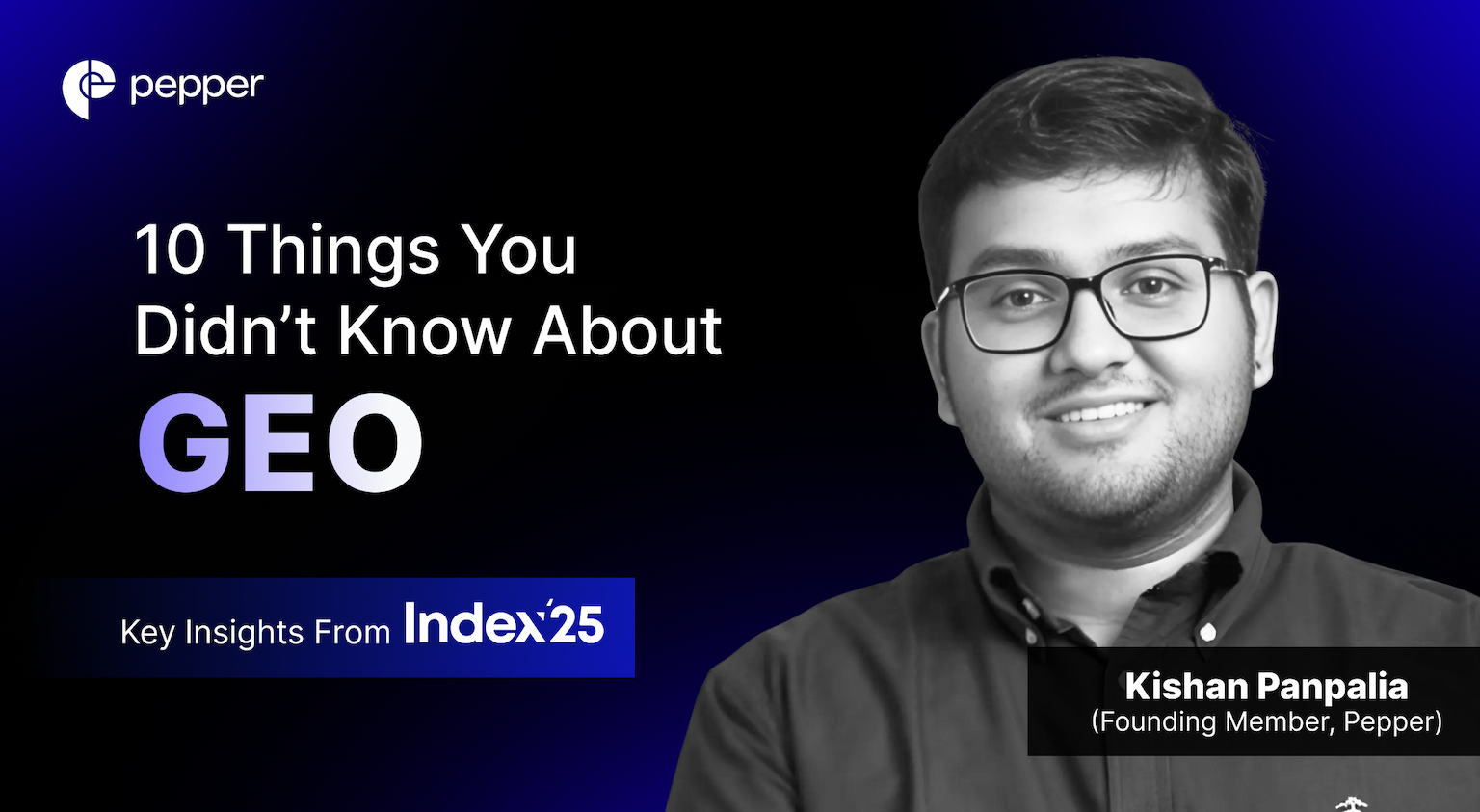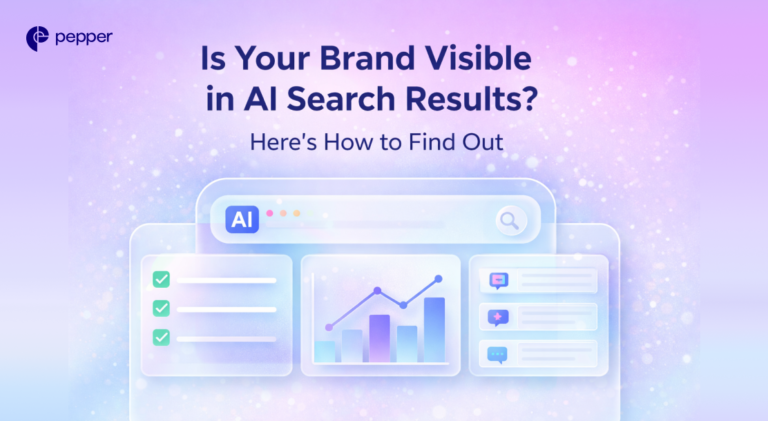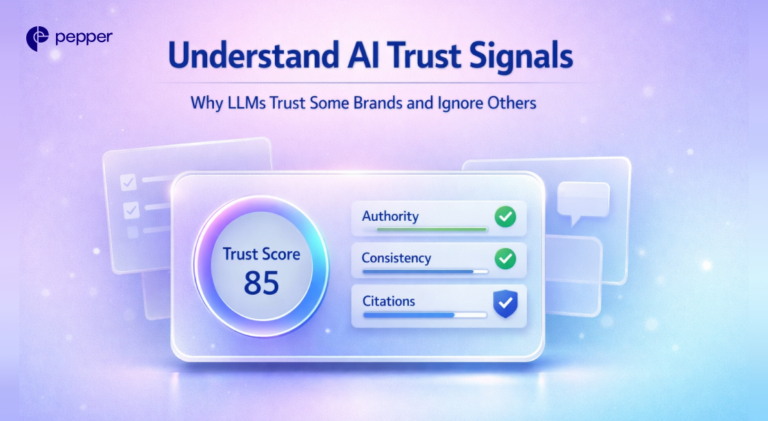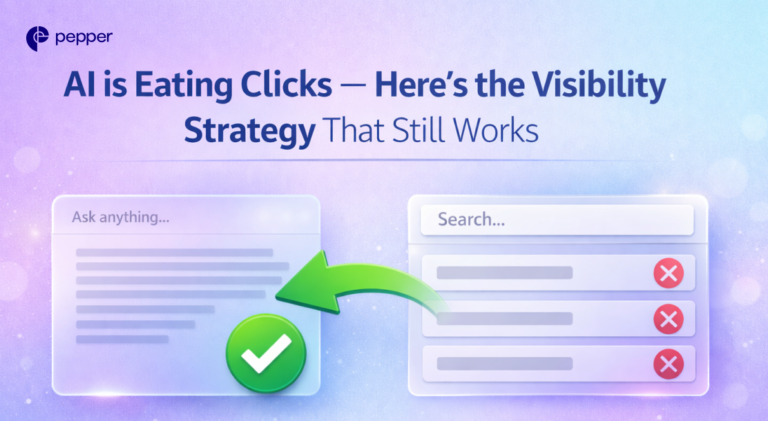10 Things You Didn’t Know About GEO: Key Insights From Index’25 by Pepper

In this special segment, Kishan, a founding team member at Pepper, unveils eye-opening insights about GEO (generative engine optimization) drawing from Pepper’s extensive research and real-world experience in the field.
Kishan Panpalia
Kishan isn’t just a GEO expert; he’s a founding member playing a pivotal role in introducing, strategizing, and building the GEO category at Pepper. His work blends deep technical research, optimization tactics, and a builder’s mindset to help brands uncover where their digital presence falters and how to excel in the era of AI-driven search.
The Evolution: From SEO to GEO
Pepper has been at the forefront of leveraging Large Language Models (LLMs) for digital marketing, making it one of the earliest companies worldwide to experiment with and reverse engineer how AI indexes online content. GEO advances SEO, focusing on making content visible, credible, and retrievable for AI systems – not just humans.
10 Game-Changing Insights About GEO
1. LLMs Love “Entities”
In traditional SEO, keywords were the main currency. In GEO, entities such as places, events, and names are what LLMs use to index and interpret content. Structuring data to maximize entity recognition boosts AI visibility.
2. How LLMs Weigh You For A Recommendation
AI search is built on mathematical frameworks including chunking, structured content, schema tags, and trust signals. Small tweaks like converting headings to interrogative questions can dramatically increase LLM citations.
3. Source Weight Matter
Different AI platforms use different weighting systems. Being listed on highly authoritative sites (Gartner, G2, Trustpilot, Wikipedia, LinkedIn, Reddit) increases your brand’s chances for AI citations.
4. #1 on Google ≠ #1 on AI-Search
AI prioritizes topical authority more than just position #1 on Google. Brands ranking across multiple related queries end up being recommended more often by LLMs.
5. Age of Content
Freshness matters! Updating website content and maintaining recent publish dates can significantly impact AI index rates, especially on ChatGPT.
6. Your Buyers Aren’t Searching. They’re Commanding
Buyers now “command” LLMs, not just ask questions. Tailoring your content using public AI prompting guides and strategic titles (e.g., “Expert’s take on…”) can align your site with emerging query formats.
7. Reddit/Quora/Linkedin Impact
OpenAI and other LLMs use Reddit and LinkedIn Pulse articles as major sources. Posting niche content here gets indexed quickly and shapes what LLMs “know” about your brand or category.
8. PR as a Growth Function
Press mentions in trusted editorial sources are increasingly influencing AI search outcomes. PR isn’t just corporate – it’s key to GEO success now.
Trusted mentions have a measurable effect on AI-driven content discovery.
9. Video Content Dominance
YouTube is the second-most cited source by LLMs. Converting your best performing web content into videos and posting them with captions boosts AI discovery and engagement across all major engines.
10. ORM: Reputation Management
Online Reputation Management is now critical for AI search visibility. Positive reviews and community engagement boost AI rankings, while negative information can significantly reduce visibility. Brands must be vigilant in maintaining and cleaning up online perceptions across review platforms and communities.
Kishan Panpalia’s closing message reminds us:
“Once in a generation, technology doesn’t just improve, it changes the way we see the world. GEO is not just a buzzword, but a new rule book for brand discovery, trust, and selection in an AI-first marketplace. Those who shape this transition will define the next digital generation.”
To understand GEO better, book a demo here
Explore more about Pepper: pepper’s profile
For more information, reach out to business@peppercontent.in
Get your hands on the latest news!
Similar Posts

Artificial Intelligence
6 mins read
Is Your Brand Visible in AI Search Results? Here’s How to Find Out

Artificial Intelligence
5 mins read
Understand AI Trust Signals – Why LLMs Trust Some Brands and Ignore Others (And How to Fix It)

Artificial Intelligence
6 mins read